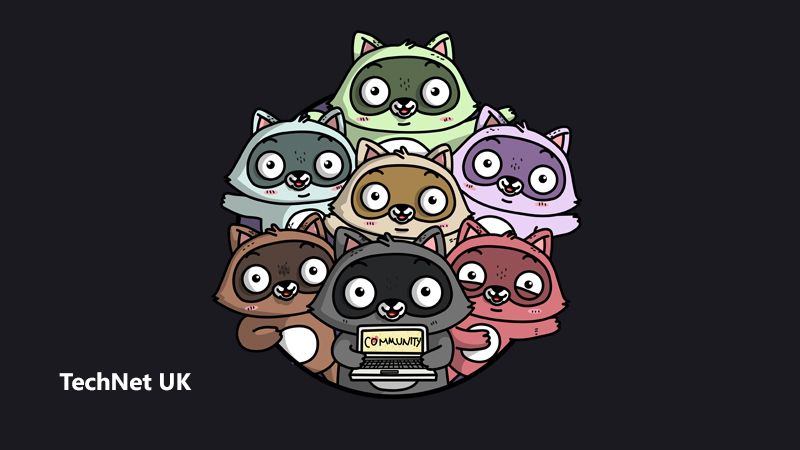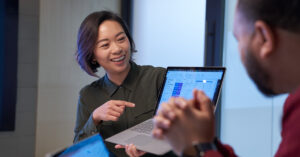
4 Insights for Women and Girls getting into Tech

To celebrate International Women’s Day, we brought together a panel of female technical experts to share their inspirational career journeys and guidance for anyone starting or building their career in a technical role.
Our panel of expert technical women feature Amy Boyd and Sarah Lean, both Senior Cloud Developer Advocates at Microsoft UK and Jese Navaranjan and Luce Carter, Microsoft UK MVPs, as they inspire you to take your next step on your technical career.
What have you learned on your tech journey that you would share with women and girls looking to start the journey themselves?
Luce: The main thing is, don’t be afraid to be yourself. With this being a notoriously male-dominated industry you might come across challenges. You might have to fight a bit harder to be listened to or taken seriously, but if you just put yourself out there and be yourself you’ll find that other people out there who are allies, whether it’s other women in tech or men who are allies and believe that we’re all equal.
Be yourself and try your best, regardless of our gender identity. Be open about the struggles that you face because you’ll find likeminded people come together, and you’ll be surrounded by people who will lift you up and make you feel supported. That’s when the world’s your oyster, and you can do anything you put your mind to.
What’s the best thing about being a woman in a highly-skilled tech role?
Jese: Bringing that diverse thinking. The diversity piece is very important – being someone that thinks differently, whether it be racial differences or gender differences, all the ways that we can be different from each other. Being able to inspire the younger generation is definitely a great thing, and meeting like-minded people in general.
In tech especially, there’s such a big social media presence and such a keen thing about your portfolio and your brand which is very exciting. Not to say that other industries don’t have that, but it’s especially the case with tech. I joined Twitter for my job, and I use it to talk about my tech and Power Platform.
What’s the most challenging thing you’ve been faced with and how did you overcome it?
Amy: This is a hard question because I’m very happy with being in the tech industry and have always really enjoyed it. There are some challenges though; we don’t want to say everything will be fine. Obviously it’s a very male dominated industry, so you will find yourself in rooms full of people who don’t necessarily look like you, but that’s okay.
It’s like a two-sided coin – sometimes it makes you the most memorable person in the room, even amongst other, similar people. On the other side of the coin – and everyone does it – we make assumptions. When you look young, on top of being a woman in tech, sometimes that does go against you a little bit because we all make immediate first impressions, or assumptions around who is the technical person in the room.
When standing on a stage and presenting we often get a lot of feedback that can be incredibly useful, but sometimes it can come back and sting. There can be comments saying things like “she actually knew what she was talking about” – that’s one that has hurt, because you can’t correct that, and you can’t change because of it.
There are still assumptions – and assumptions are totally natural – but surrounding yourself with great people, as well as people who will pick you up when you need to be picked up, is a really positive part of being in this industry as well.
For anyone wanting to get into technology, do you have any advice for them?
Sarah: I think most of the resources I used when starting out were more community resources, using the internet to learn how to build my own PC, or fix that printer at home. Nowadays we have great platforms like Microsoft Learn – obviously it’s Microsoft so I’m a bit biased, but it’s a great platform for learning new technologies and building on your existing skills. I use it every day, and there’s something there for everyone.
Technology is one of those careers that can help you do whatever you really want to and help you travel, too. I’ve travelled massively for my job because how you use your PC here in Scotland is the same as how someone in England or Australia uses it. Technology gives you a massive scope if you want to build travel into your career.
Don’t be frightened to learn stuff and ask questions. There’s a whole host of people nowadays that are creating content like blogs and videos, so there’s tons of information out there that you can gather regardless of who is teaching that kind of content. Don’t be frightened to ask and try stuff.
I’ve built a few PCs in my time, and also blown up a few PCs in my time. I had to ask friends how to fix them, but that’s the way you learn – you learn by doing, by breaking stuff and asking questions. You’ll find that most people are quite happy to give you their time and advice if you are genuinely looking to learn.
-=-
This is just a snippet of the learnings from the panel – be sure to check out the full video on the Microsoft Developer UK YouTube channel.
Learn More
- TechHer – A Microsoft learning event series for women
- Find learning resources on Microsoft Learn and Microsoft Learn TV
- From NT4 to 2022: Windows Server, and the journey from flight attendant to IT Pro
- The ultimate guide to attending technical events remotely in the UK
- The ultimate soft skills toolkit




